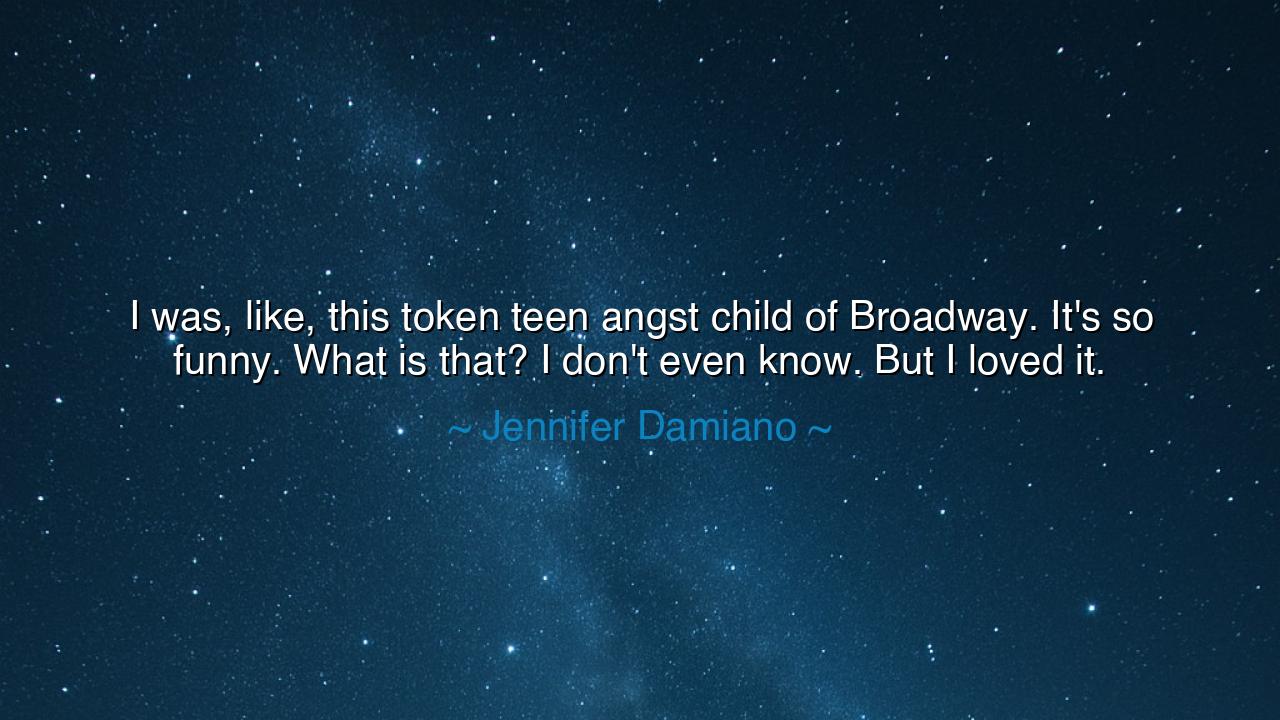
I was, like, this token teen angst child of Broadway. It's so
I was, like, this token teen angst child of Broadway. It's so funny. What is that? I don't even know. But I loved it.






Jennifer Damiano, a voice forged in the lights and shadows of the stage, once said: “I was, like, this token teen angst child of Broadway. It’s so funny. What is that? I don’t even know. But I loved it.” In these words there is both humor and revelation. She reflects upon her early years in the theater, when her roles and presence carried the mark of teen angst, that storm of passion, doubt, and yearning which defines the threshold between childhood and adulthood. She did not fully understand the title given to her, but she embraced it, for it was a part of her journey, a mask she wore in the great play of life.
The origin of this saying lies in her early career, when Damiano, still a teenager, stepped into the demanding world of Broadway. She became known for playing characters marked by intensity, vulnerability, and longing. To be called a “token teen angst child” is to be seen as a symbol of youthful turbulence—a figure whose struggles mirror the restless hearts of a generation. She laughs at the label, yet admits she loved it, for even within the stereotype, there was truth: she embodied the honesty of youth, raw and unrefined, yet filled with fire.
The ancients, too, knew of such roles. In the dramas of Euripides, the stage was filled with characters caught in storms of passion and inner conflict—youths and maidens who wrestled with identity, love, and rebellion. Their turmoil gave voice to the very essence of humanity, showing that the struggles of youth are not trivial but eternal. To be the “angst child” of Broadway is, in essence, to stand in the same lineage as those mythic figures who raged and wept before the eyes of the world.
Consider also the story of Arthur Rimbaud, the French poet who, as a teenager, wrote verses of such burning intensity that he shook the literary world. He too embodied youthful angst, filled with defiance and longing, and became a “token” symbol of adolescent brilliance. Like Damiano, he may not have fully understood the mantle laid upon him, but he lived it, and in doing so, revealed truths about youth that still echo across the ages.
Yet Damiano’s words carry not only reflection, but joy. She says, “But I loved it.” Here lies the heart of the teaching: to embrace even the labels, the roles, and the identities others assign to us, for they are stepping-stones on the path of becoming. She may not have chosen to be the emblem of teen angst, but in loving it, she transformed it into strength, into art, into something that could speak to others. Her acceptance shows the wisdom of turning what might seem a burden into a gift of self-expression.
The lesson for us is this: do not despise the roles you are given in your youth, even if they feel limiting or confusing. For in every role, there is opportunity—for growth, for expression, for connection with others who see themselves reflected in you. If you feel yourself branded as “different,” “awkward,” or “intense,” wear it with pride, for it may be the very thing that allows you to create, to inspire, and to heal others through your presence.
Practical wisdom flows easily from this truth. Whatever role life gives you—whether in art, in work, or in relationships—embrace it fully, but do not let it define your entirety. Love it for the season it is in, and let it teach you, as Damiano loved being the “angst child” of Broadway. Then, when the time comes, step into new roles with equal joy. Each mask, each identity, is but another act in the great theater of your becoming.
So, children of tomorrow, remember Jennifer Damiano’s words: even if you do not fully understand the titles placed upon you, live them with passion. For the world may see you as a symbol of teen angst, or something else entirely, but it is in embracing your role with love that you turn it into art, into legacy, into wisdom. And like her, you may one day look back, laugh, and say: “I don’t even know what it meant—but I loved it.”






AAdministratorAdministrator
Welcome, honored guests. Please leave a comment, we will respond soon